John 19:13 – So when Pilate heard these words, he brought Jesus out and sat down on the judgment seat at a place called The Stone Pavement, and in Aramaic Gabbatha.
As we concluded our post last week, we left Pilate at the moment of truth – would he crumble under the threats of the Jewish religious leaders, or would he stand for truth/justice and pronounce Jesus innocent of all charges?
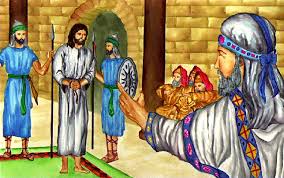
Of course, this really isn't a cliffhanger because we all know what happened. Pilate heard the veiled threats of the Jews; they would accuse him of treason if he didn't crucify Christ. He was more afraid of losing his life than his soul, so he chose to try and save/protect himself by giving in to the pressure of the Jews (Matthew 16:26).
Once his decision was made, his only course of action is to pronounce judgment on the prisoner. In our culture, this would occur in a courtroom, where the judge would sit up on his bench and the prisoner would stand before him to receive sentencing. But back then, sentencing occurred at a place called the judgment seat.
The judgment seat was normally located in an outdoor, open court area. In Roman culture, was customary for the floor of this space to be paved with stones of various colors; marble was frequently used for this purpose. Because of the unusual floor this location was also referred to as 'The Stone Pavement'.
John tells us that it was also commonly called "Gabbatha" which means 'elevated' or 'lofty'. This is the only time the word is used in scripture, and it is believed to refer to an elevated bench occupied by the governor as he passed sentence.
As we go through the judgment scene, I encourage you to picture yourself in the place of Jesus. Imagine yourself standing bound and humiliated before the judgment seat of Almighty God where you would justly be condemned for your sin. Imagine the hopelessness of being sentenced to eternity in hell, without any chance of escape or reprieve. Then earnestly give thanks to Jesus for taking your punishment upon himself!
John 19:14 – Now it was the day of Preparation of the Passover. It was about the sixth hour. He said to the Jews, "Behold your king!"
The day of Preparation is exactly what it seems – the day before the Passover Sabbath, which the Jews used to make everything ready for the Passover celebration as well as the feast of unleavened bread, which commenced the day after Passover.
John gives the time of the sentencing as about the sixth hour. As you recall from some of our other studies, the Jews considered the day to begin at 6 am and they counted time starting from that point. Therefore, the sixth hour means six hours after 6 am, or noon.
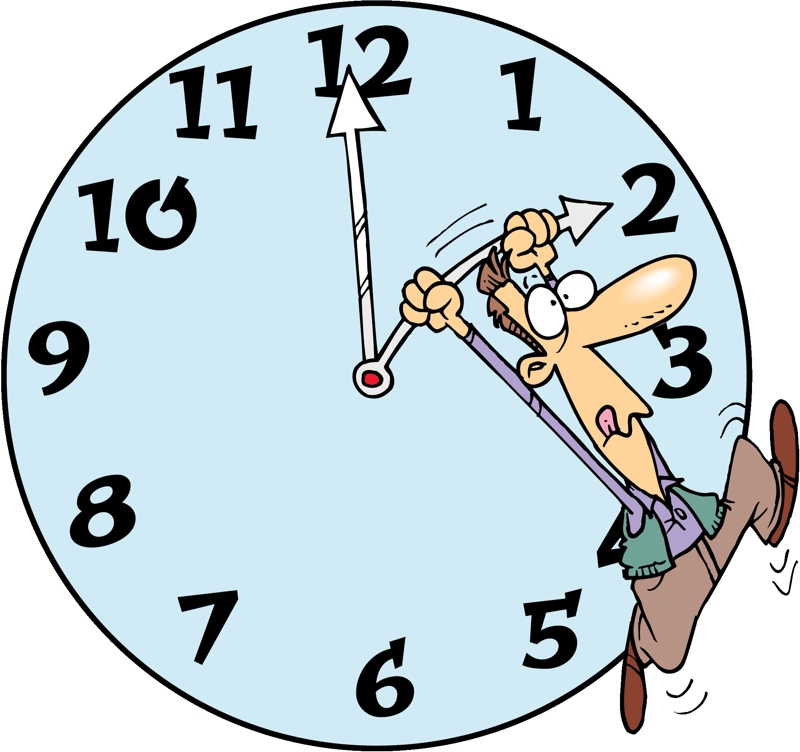 So according to John, Jesus was condemned around/approximately at noon and crucified sometime after.
So according to John, Jesus was condemned around/approximately at noon and crucified sometime after.But Mark tells us that Jesus was crucified at the third hour (Mark 15:25), which is 9am.
Various explanations have been given for this discrepancy. They include an error in translating the number in the text (6 instead of 3), differences in the division of hours/time between the Romans and Jews and alternate ways the Jews marked or 'blocked' time.
In the end, I think one commentator summed up the situation perfectly by noting 'no solution of the discrepancy is wholly satisfactory'. Rather than spending our time and energy adding to this unsolvable mystery, we are simply going to acknowledge that the discrepancy exists, and move on to other points that can aid in our spiritual edification.
What we know for sure is that Pilate once again brought Jesus outside to the Stone Pavement where the agitated and combative Jews were waiting.
But this time he must have looked very different. He had been up all night. He had been savagely whipped - his back had long, deep wounds; blood soaked through the thread bare purple robe and ran down his legs. He was also profusely bleeding from his head, where the crown of thorns still rested upon his brow. His face was bruised, swollen and almost unrecognizable – the result of being hit in the face numerous times and having portions of his beard plucked out. As a result of blood loss and dehydration, he was probably unsteady on his feet as he stood there, bound in manacles.
Now picture Pilate raising a hand towards Jesus and saying, "Behold your king!"
Perhaps Pilate made this declaration to shock the Jews. He may have been trying to show them once again that, despite their accusations, Jesus was no threat to Rome and he should be released. Alternatively, he may have been trying to garner pity from the common Jews, hoping they could sway the priests. Or maybe Pilate was mocking the Jews – if this was their king, they would always be subject to Rome!
John 19:15 – They cried out, "Away with him, away with him, crucify him!" Pilate said to them, "Shall I crucify your King?" The chief priests answered, "We have no king but Caesar."
This statement proves that the priests have gone completely mad!
The Messiah was the foundation for the entire Jewish law and all of the promises God made to his people. To reject him was to throw away every grace and blessing of God.
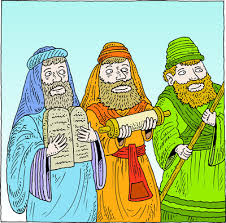
Yet, here we have the priests, who were (or should have been) well acquainted with the law violently rejecting Jesus as their king!
It might be argued that the Jews did not believe in Christ as the Messiah. But even if that is a legitimate excuse (which it isn't), there is absolutely no way to justify their statement 'We have no king but Caesar'.
Did they really prefer the utter tyranny of Rome to the government of righteousness, peace and justice of God's kingdom? Really? Because that is what they were choosing – death and misery over peace and joy.
It wouldn't be long before they regretted their choice. In 71 AD Rome stormed Jerusalem, destroying the temple and massacring the Jews.
John 19:16 – So he delivered him over to them to be crucified.
Although John omits it from his account, Matthew tells us that Pilate, in an effort to ease his own guilt, places full responsibility for the unjust execution of Jesus upon the Jews. He does this by symbolically washing his hands:
Matthew 27:24 - When Pilate saw that he could gain nothing, but that rather a tumult was made, he took water, and washed his hands before the multitude, saying, I am innocent of the blood of this just person: see you to it.
Pilate now issues orders – Barabbas is to be set free, while Jesus (and two robbers) is sentenced to immediate executed by crucifixion.
John 19:17-18 - So they took Jesus, and he went out bearing his own cross, to the place called The Place of a Skull, which in Aramaic is called Golgotha. There they crucified him, and with him two others, one on either side, and Jesus between them.
Crucifixion was a punishment reserved for slaves and the vilest criminals in society. It was considered such a curse that Roman citizens were exempt from it.
Crucifixions were performed outside of the city walls, and it was not uncommon for the Romans to make the condemned man carry his own cross. It was a punishment designed to not only humiliate the prisoner, but to further weaken him and hasten death.
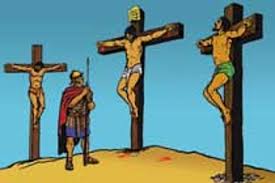
The other gospel writers tell us that Jesus began to faint along the way and the Romans commanded a passerby, Simon of Cyrene, to bear the burden of the cross for Jesus (Mark 15:21). This was not an act of mercy. It was an unimaginably cruel thing to do; they did not want Jesus to die quietly by the side of the road. They wished him to remain alive so he could be subjected to the unbearable pain, suffering and humiliation of the public death they had planned for him.
This event sometimes raises a question in our minds: Why couldn't Jesus carry his own cross? Why would he need help from someone else?
Here are some possible reasons:
- Jesus was in an extremely weak physical state. He hadn't had any sleep in over 24 hours, and nothing to eat or drink in since the prior day. He had been savagely beaten and was bleeding profusely.
- The sharp edges of the wood grated on his raw and bleeding shoulders.
- Perhaps this was a demonstration for our benefit – it was proof of his humanity. Jesus was fully God, yet fully human. He was subject to all of the constraints and weaknesses of a fleshly body, just like we are. And even though he was tempted like we are, he was without sin (Hebrews 4:15).
We know that Jesus was crucified in the midst of two convicted robbers who were considered the scum of the world. The Jews no doubt rejoiced in this because it seemed to confirm their own allegations that Jesus was guilty.
But we are not fooled by this because we know that long before the crucifixion, the prophets revealed that Jesus would be 'numbered with the transgressors':
Isaiah 53:12 - Therefore will I divide him a portion with the great, and he shall divide the spoil with the strong; because he has poured out his soul unto death: and he was numbered with the transgressors; and he bore the sin of many, and made intercession for the transgressors.
We are also not surprised by the method of death. Scripture tells us that anyone who is hanged on a tree is cursed by God:
Deuteronomy 21:23 - His body shall not remain all night upon the tree, but you shall surely bury him that day; (for he that is hanged is accursed of God;)
The guilt of our sin could only be removed by the Son of God becoming a curse for us, which he did back on the day of his crucifixion. Because of his sacrifice, we can have full confidence that he has redeemed us from the curse of the law. We are now new creatures in Christ; we are righteous in the sight of God.
Galatians 3:13 - Christ has redeemed us from the curse of the law, being made a curse for us: for it is written, Cursed is every one that hangs on a tree:
2 Corinthians 5:21 - For he has made him, who knew no sin, to be sin for us; that we might be made the righteousness of God in him.
The more we study the death of Christ the more we find that his death fulfilled/satisfied the wrath of God in even the most minute detail. The plan of salvation is perfect, complete and foolproof. There are no loopholes or loose ends.
For instance, did you know that under the Old Testament law, when an animal was sacrificed for sin, the body was always carried outside of the camp (Leviticus 16:27)? This is why Jesus was crucified outside of the city of Jerusalem.
Here is something interesting to ponder this week – It has been said that the four limbs of the cross reflect the height, depth, length and breadth of the love of Christ, forever extending salvation to all (Ephesians 3:17-19). Praise his name!
John 19:19 – Pilate also wrote an inscription and put it on the cross. It read, 'Jesus of Nazareth, the King of the Jews.'
It was customary for the Romans to post the crime of executed prisoners over their heads as they were crucified. It not only served as a deterrent to crime, it justified the actions of Rome in the eyes of the people.
In the case of Jesus, we find that Pilate ordered the plaque to say 'Jesus of Nazareth, King of the Jews'. This is a far cry from the words 'insurrectionist' or 'traitor' which were the crimes Jesus were sentenced for.
It is possible that in choosing the title he did, Pilate was delivering a final parting shot at the Jews for bullying him into having an innocent man executed. In a way, the title throws blame onto the whole Jewish nation, which cried out for the release of Barabbas and the bloody execution of Christ. It also ridicules the entire Jewish nation by implying that anyone who attempts to lead/deliver the Jews from Rome would meet the same fate.
Whatever his petty motivations might have been, we know the providence of God was guiding the pen of Pilate. His inscription certainly does not brand Jesus with the commission of any crime.
In fact, 'King of the Jews' is a well known Messianic title, so the inscription was a clear acknowledgement that Jesus was the Messiah. Thus, his true honor/glory was openly proclaimed by his enemy in the midst of his greatest reproach and suffering. Pilate correctly labels Jesus the Author of Salvation, even though he did not know the meaning of what he wrote.
John 19:20-21 – Many of the Jews read this inscription, for the place where Jesus was crucified was near the city and it was written in Aramaic, in Latin and in Greek. So the chief priests of the Jews said to Pilate, "Do not write, 'The King of the Jews,' but rather, 'This man said, I am King of the Jews.'"
Not surprisingly, the chief priests and religious leaders were angry about the title. They recognized the insult of Pilate and they wanted the inscription changed immediately, so that it placed blame for the whole situation on Christ.
John 19:22 – Pilate answered, "What I have written I have written."
Because Pilate plainly intended to insult the Jews with the inscription (and probably because he was now sick and tired of them), he flatly refuses to change the inscription.
But I believe there was more to it – it was God's sovereign hand that kept the truth posted on that cross in the three main languages of the known world.�It was a message of salvation to the world - the Messiah had come and the way was open for Jew and Gentiles to return to God. It was also a message of warning to the Jews – no other Messiah was coming. If they rejected Jesus, nothing was left for them but the deceptions of false antichrists.
John 19:23-24 – When the soldiers had crucified Jesus, they took his garments and divided them into four parts, one part for each soldier; also his tunic. But the tunic was seamless, woven in one piece from top to bottom, so they said to one another, "Let us not tear it, but cast lots for it to see whose it shall be." This was to fulfill the scripture which says, "They divided my garments among them, and for my clothing they cast lots." So the soldiers did these things.
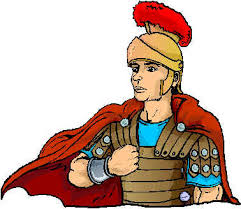
The prophesy that John mentions in this passage regarding the division of Jesus' clothing is found in Psalms 22:18. Now, if the soldiers stripped Jesus and divided his clothing, the natural assumption is that Jesus was crucified naked, or with only a small covering. Knowing the cruelty of the Romans, it is likely they would have further humiliated him by forcing him to die naked.
It has been noted that once man sinned in the Garden of Eden, he was both naked and ashamed. Jesus suffered naked on the cross, that we might be permanently clothed with garments of salvation and robes of righteousness (Isaiah 61:10). All our sin and shame has been washed away!
John 19:25-27 – ...but standing by the cross of Jesus were his mother and his mothers sister, Mary the wife of Clopas, and Mary Magdalene. When Jesus saw his mother and the disciple whom he loved standing nearby, he said to his mother, "Woman, behold, your son!" Then he said to the disciple, "Behold, your mother!" And from that hour the disciple took her to his own home.
It is commonly believed that Mary's husband Joseph was dead by this time, but thankfully she was not alone in her grief. We find her supported during this tragedy by some of her friends.
It is hard to imagine the turmoil and heartache that Mary, mother of Jesus, suffered on that day. She knew full well that her son was divine. Perhaps she entertained notions of a physical kingdom on earth for her son, just as the disciples did. If so, this was an even more terrible agony to her. Truly, her heart must have been 'pierced by a sword' as prophesied by Simeon on the day Jesus was dedicated in the temple (Luke 2:34-35).
But even in the midst of his own suffering, Jesus remembers her. In one of his final commands, he made the apostle John her adopted son, and she John's adopted mother. As such, John would provide Mary with a home and all the necessities of life until her death.
Although Mary was not present on the day of Jesus' resurrection, she remained in fellowship with all of the disciples and was likely present in the upper room on the day of Pentecost (Acts 1:14).
John 19:28 – After this, Jesus, knowing that all was now finished, said (to fulfill the scripture), "I thirst."
As is his custom, the apostle John will skip over many of the events that occurred at the crucifixion which the other evangelists relate. He chooses to focus on the final moments of Jesus' life.
Thirst is a notorious symptom of those who are crucified. Jesus suffered a significant amount of blood loss from the scourging, his wounds were highly inflamed, he underwent the physical exertion of carrying the cross and he was crucified in the heat of the day. No wonder he was thirsty!
But despite his indescribable suffering, he gave the world one last proof of his identity as the Messiah. By admitting he was thirsty, Jesus fulfilled the Messianic prophesy of Psalms 69:21.
John 19:29-30 – A jar full of sour wine stood there, so they put a sponge full of the sour wine on a hyssop branch and held it to his mouth. When Jesus had received the sour wine, he said, "It is finished," and he bowed his head and gave up his spirit.
The jar of sour or tart wine (your translation may say 'vinegar') was the common drink of the Roman soldiers. The jar may have been provided for them to drink as they worked the multiple crucifixions of the day. However, since there was a sponge and hyssop branch nearby, it is possible wine was provided for the thirst of those being crucified.
In either case, after fulfilling the prophesy, Jesus proclaims, "it is finished"!
What did he mean?
The Father's will and purpose which the trinity decreed from ages past, was now accomplished. Mankind could once again have fellowship with God (Revelation 21:3).
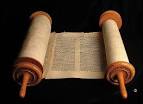
The scriptures are now fulfilled! Jesus did not come to abolish the law, but to fulfill it (Matthew 5:17). All of the Old Testament types or pictures of the Messiah have received their final accomplishment in him.
Our salvation is now complete. The price of our sin has been fully paid; God's wrath has been completely satisfied (I Thessalonians 5:9).
The fury, malice, rage and revenge of the enemies of Christ was now ended. The suffering and sorrow of the Son of God is over – and it has ended in victory!
Satan is now defeated; the power of darkness is broken. We now have victory through Christ Jesus our Lord, Savior and King! Hallelujah!
Let me offer you some encouragement:
God gave us his all. He gave us his only begotten Son to make atonement for our sin. Once that was done, he made us joint heirs with Christ. This means that all that the Father has is available to us because of Jesus!
In light of that, shouldn't we give our best to him? I encourage you to think of an area of your life that is not yet fully surrendered to God, and make an effort to give that to him this week.
Let me offer you some relief:
Mary, the mother of Jesus, was a widow when Jesus was crucified. But as we noted in today's post, she found comfort in her friends and relatives.
It is no coincidence that the church is called the 'family of God'. The men and women who attend your local church are truly your brothers and sisters. They can be a great relief to you during times of heartache and tragedy by offering you support, comfort and love. And you can do the same for them.
So be sure to get involved in your local church. It is a great place to find fellowship and establish friendships that will last until eternity.
Let me offer you some strength:
Sometimes when we look around the world, it looks like Satan is winning the war. But nothing could be further from the truth!
Satan never, ever, ever had the ability to defeat God. Demonically inspiring the Jews to kill the Savior did not give him victory, it merely sealed his fate for eternity!
So don't be discouraged by what you see around you. Stand firm/strong in your faith and keep praying and declaring the kingdom of heaven on earth. When the appointed time comes, Jesus will return to earth again for his victorious bride, the church. What a wonderful day that will be!
